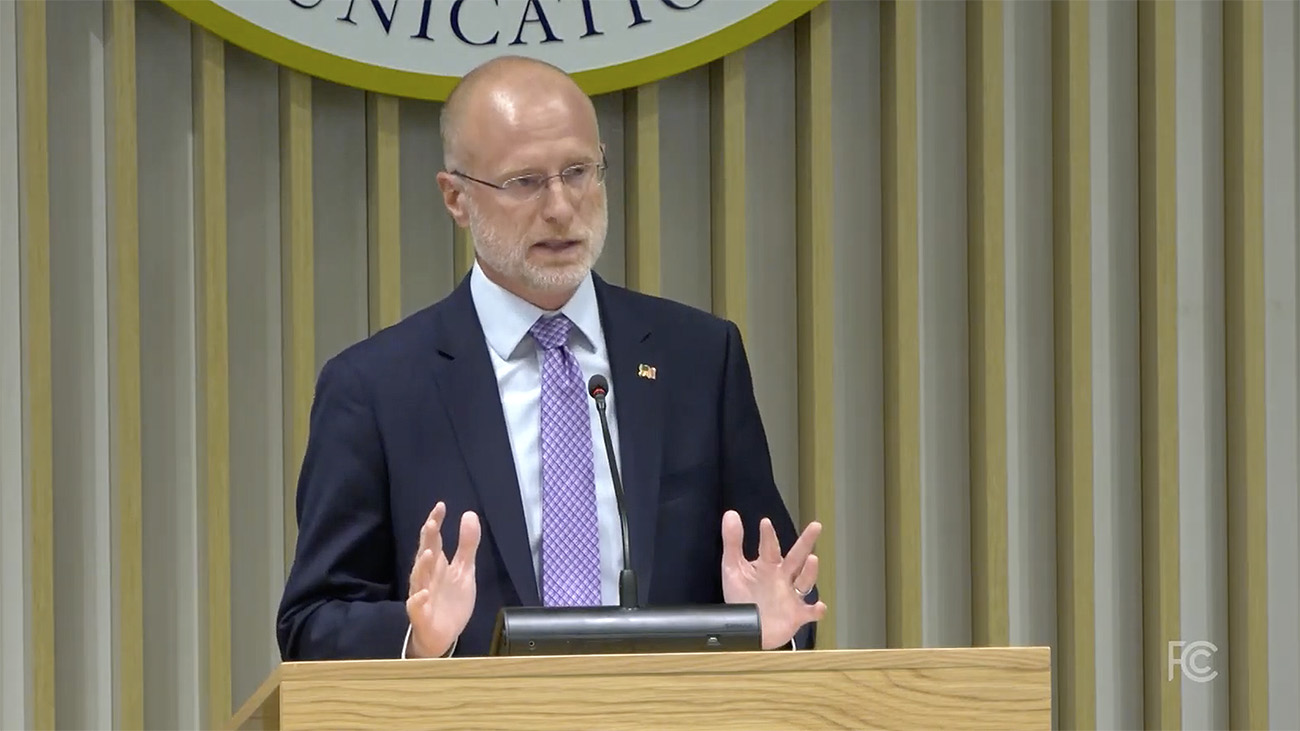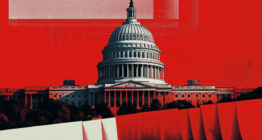FCC’s Carr signals tougher broadcast regulation incoming with focus on empowering local stations

Subscribe to NewscastStudio for the latest news, project case studies and product announcements in broadcast technology, creative design and engineering delivered to your inbox.
FCC Chairman Brendan Carr outlined his vision for media policy at a press conference on April 28, 2025, highlighting efforts to empower local broadcasters while emphasizing enforcement of public interest obligations tied to broadcast licenses.
“Localism is one of the key guiding stars of our media policy,” Carr said. “I think it’s important to separate in people’s mind the difference between national programmers and the local broadcasters. Let’s empower those local broadcasters, but also they’re the ones that ultimately have the public interest obligation.”
The chairman noted that trust in national media is at “an all-time low” while local broadcasters maintain higher public confidence. He expressed concern about affiliation agreements between national networks and local stations, referencing a letter he sent to ABC last year examining whether such agreements exercise “too much control over local broadcasters.”
Sweeping regulatory review underway
Carr’s comments on broadcasting come as the commission pursues what may be one of the most sweeping deregulatory efforts in recent memory. The chairman referenced the initiative during his press conference, calling it “probably the largest deregulatory initiative at the FCC in our delete, delete, delete proceeding.”
The initiative, titled “In re: Delete, Delete, Delete,” solicits public comment on “every rule, regulation, or guidance document that the FCC should eliminate,” according to the commission’s public notice.
The effort explicitly aligns with President Trump’s deregulatory agenda, referencing Executive Order 14192, “Unleashing Prosperity Through Deregulation,” and Executive Order 14219 on implementing the “Department Of Government Efficiency” initiative.
“We’ve been doing a lot of spade work at the FCC,” Carr explained during the press conference. “We’ve had all the bureaus and offices basically complete an initial sweep of all the regulations with an eye towards which ones we need to keep, which ones we need to modify, which ones do we have the freedom to go ahead and delete.”
Industry observers note broadcast ownership caps could be among rules on the chopping block. The National Association of Broadcasters has previously urged the agency to remove the ownership cap preventing local TV stations from expanding beyond 39% of the American viewing audience.
Focus on local broadcasters
Meanwhile, Carr emphasized the importance of local stations maintaining editorial independence from national networks, suggesting current arrangements may be inhibiting local broadcasters’ ability to serve their communities effectively.
“When you look at all of the studies about trust in media right now, you know, trust in media is at an all-time low. But it’s not uniform,” Carr explained. “There’s that second level, which is the actual local broadcasters that are licensed by the FCC. And trust there is actually significant higher.”
“We don’t want local broadcasters to ultimately go the way of newspapers,” Carr said. “When you look at the current dynamic, I’m not sure it’s entirely healthy. I want strong local broadcasters that feel empowered to serve their local communities.”
The chairman directly addressed affiliation agreements, noting their potential impact on the broadcast ecosystem. “A lot of them have been coming due. I wrote a letter actually at the end of last year to ABC on that to look at ways in which affiliation agreements potentially are being used to exercise potentially too much control over local broadcasters, which could ultimately become an attribution issue that we would need to look at.”
Public interest standard enforcement
While pursuing deregulation, Carr also addressed the FCC’s approach to public interest standards, indicating a more assertive enforcement posture.
“Given the unique benefits that come from a federal broadcast license, it’s important for the FCC to actually hold these entities accountable to the public interest,” he said. “I think over the years, the FCC has largely stepped back from enforcing the public interest standard. I don’t think that’s correct.”
He distinguished broadcasters from other media entities, noting their special regulatory status.
“Broadcasters have a very unique position in the market when it comes to other entities. They are licensed by the FCC, and when you license someone to operate, you’re necessarily prohibiting others from using those airwaves.”
“If there’s people that want to speak, to communicate, but they don’t want the burdens that come from a federal spectrum license, then they have the opportunity to do that. There’s lots of options. There’s podcasts. There’s cable shows. Those don’t have the same type of federal public interest obligations that broadcasters do.”
Ongoing investigations and enforcement tools
Carr confirmed ongoing investigations, including one examining Disney and ABC for “potential discrimination” related to DEI practices.
“We’ve looked at Disney and ABC in particular for some of their DEI practices. There’s some concerning things that we’ve seen there about potential discrimination that we are continuing to run down inside the building,” he said, while noting the investigation remains in process.
When asked about enforcement tools available to the commission, Carr acknowledged a recent Fifth Circuit decision limiting the FCC’s fining authority but said the commission disagrees with that ruling.
“We respect the decisions of the appellate courts, but that continues to not be the case in terms of our own view,” he stated, noting the commission has filed responses in other circuits expressing disagreement with the Fifth Circuit’s conclusion.
He characterized license revocation as “the regulatory death penalty” while confirming it remains an available enforcement tool. “License revocation is a tool that the FCC has in its toolkit. It’s long been viewed as sort of the regulatory death penalty, so it’s a pretty high bar to meet to go down that path, but it is one of the options the FCC has.”
Subscribe to NewscastStudio for the latest news, project case studies and product announcements in broadcast technology, creative design and engineering delivered to your inbox.







tags
Brendan Carr, FCC
categories
Broadcast Business News, Heroes, Policy